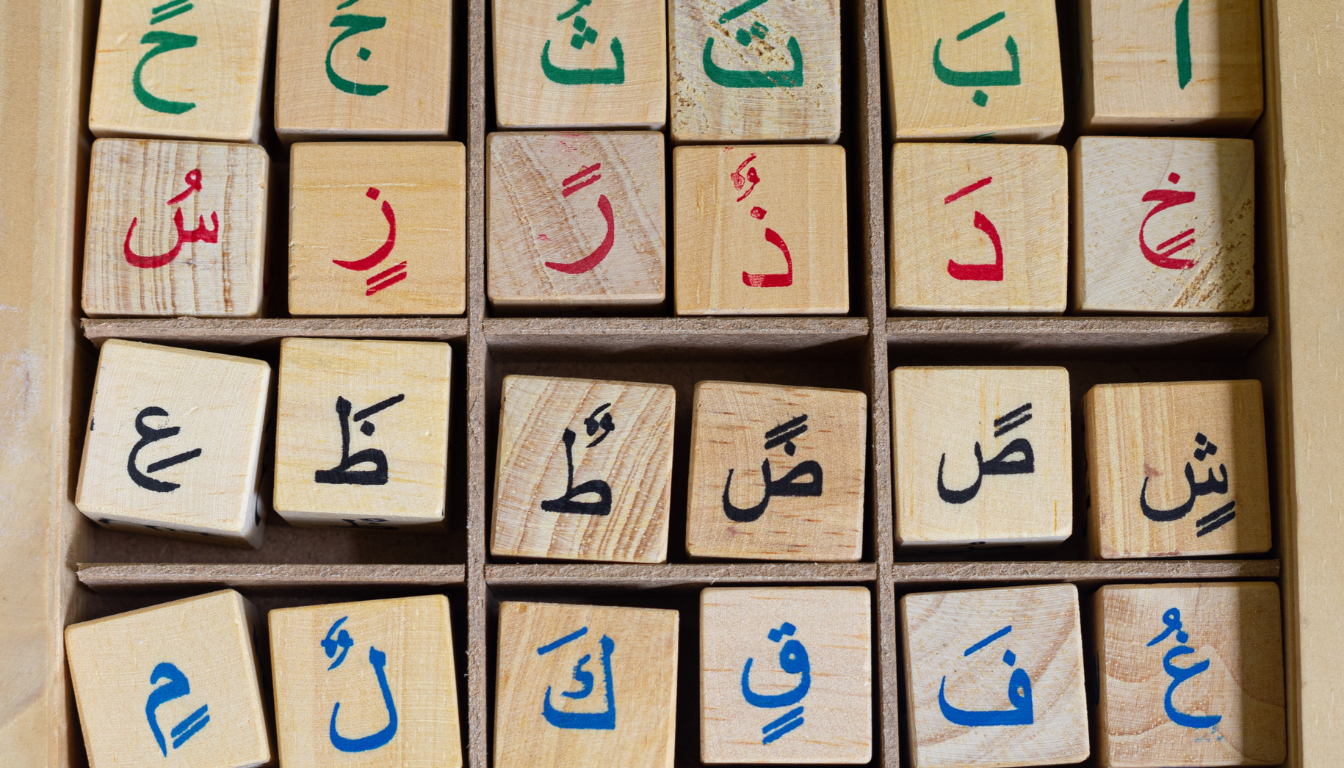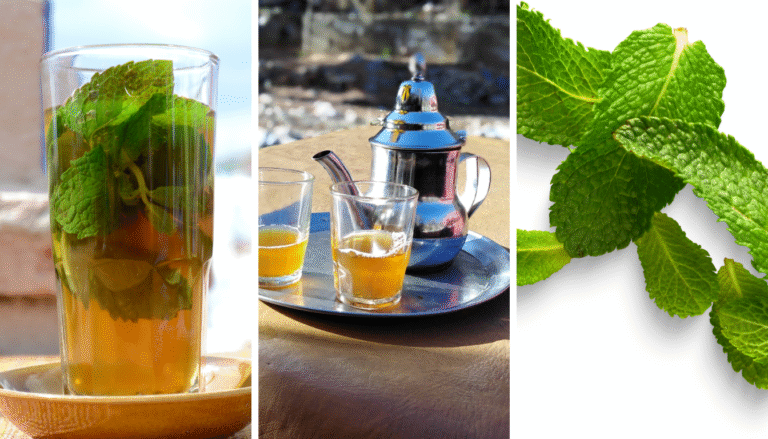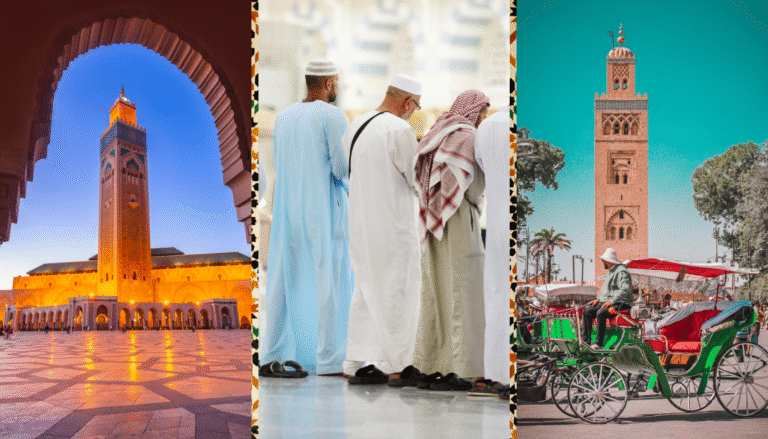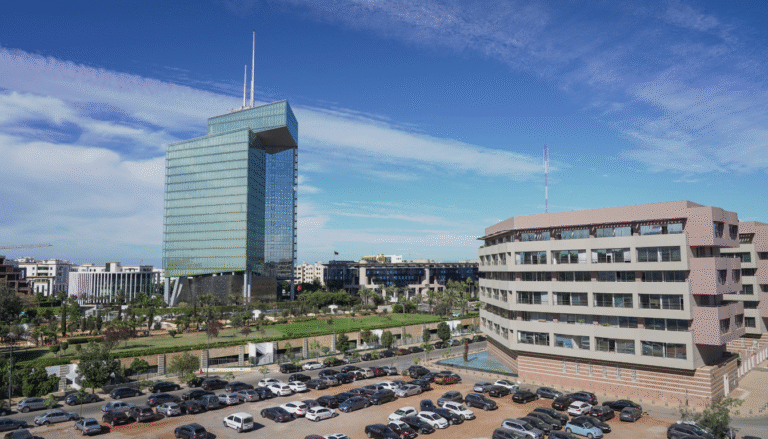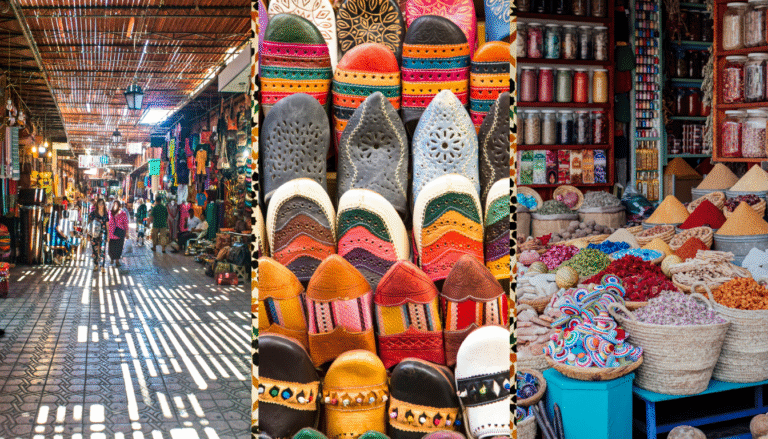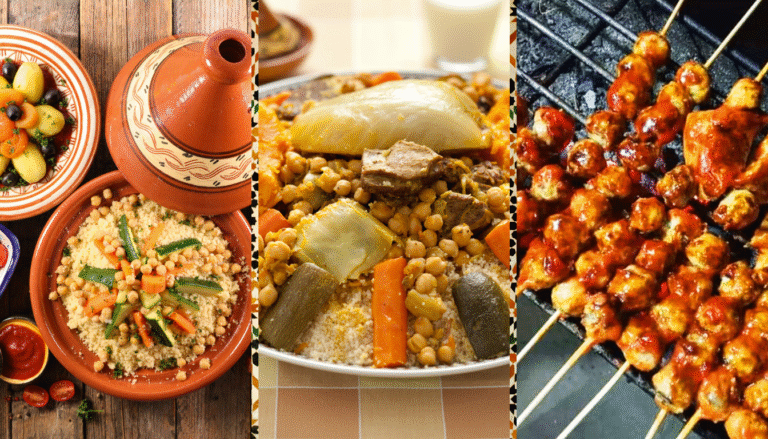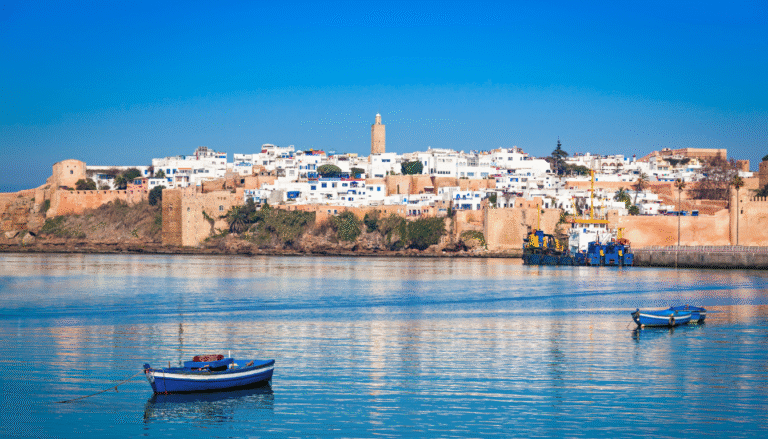10 Useful Arabic and French Phrases for Travelers in Morocco
Did you know Morocco is a mix of languages? Arabic, French, Berber, and English are all spoken here.
When you’re getting ready for your cultural exchange trips to Morocco, knowing the local languages can make your trip better. Many in the hospitality industry speak English. But, locals really appreciate it when visitors try to speak their language.
Learning a few key phrases can make your trip more fun and meaningful. In this article, we’ll show you 10 useful phrases. They’ll help you get around Morocco like a local. You’ll have better interactions with the friendly locals and make your multilingual holiday experiences even richer.
The Multilingual Magic of Morocco
Morocco’s language mix is both interesting and rich. It combines Arabic and French, showing off its deep culture. As you wander through this amazing country, you’ll see how language shapes your adventures.
Understanding Darija, Modern Standard Arabic, and French
In Morocco, many languages live together. Darija, or Moroccan Arabic, is what people talk about every day. Modern Standard Arabic is used for serious talks, school, and writing. And French is key in business, government, and for tourists.
- Darija is key for real talks with locals and getting the true vibe.
- Modern Standard Arabic is important for serious talks and reading signs and papers.
- French helps a lot in tourism, reading menus, and official papers.
How Language Shapes Moroccan Cultural Experiences
Language is more than just talking; it opens doors to culture. By learning local tongues, your trip gets better. Saying hello in Arabic or French can make your visit warmer and more meaningful.
Whether you speak French or Arabic, knowing Morocco’s languages makes your trip richer. Taking a language immersion vacation can really connect you to the culture. It makes your travels unforgettable.
Essential Greetings for Arabic French Travelers
Traveling to Morocco? Knowing a few key greetings can make your trip better. Morocco is a place where Arabic and French are big, making it special for visitors.
“As-salamu alaykum” (Peace be upon you) & “Bonjour” (Hello)
It’s important to greet locals with respect. “As-salamu alaykum” means “peace be upon you” in Arabic. “Bonjour” is French for “hello” during the day. Using these greetings shows you care about their culture.
“Sabah al-khair” (Good morning) & “Bonsoir” (Good evening)
When you greet, think about the time. “Sabah al-khair” is “good morning.” “Bonsoir” is “good evening.” These are good for many situations, from casual chats to formal events.
Regional Variations in Greetings Across Morocco
Morocco has many cultures, and greetings change in each area. Knowing these differences helps you get around better.
| Greeting | Translation | Usage |
|---|---|---|
| As-salamu alaykum | Peace be upon you | Common greeting |
| Bonjour | Hello | Daytime greeting |
| Sabah al-khair | Good morning | Morning greeting |
| Bonsoir | Good evening | Evening greeting |
Learning these greetings can make your Morocco trip better. It helps you connect with the locals.
Expressing Gratitude and Basic Courtesies
Showing gratitude in Morocco is more than just saying thanks. It’s about understanding and respecting the culture. When you appreciate the hospitality, your trip will be much better.
“Shukran” and “Merci beaucoup”
It’s key to thank people when they help you. Say “Shukran” (thank you) in Arabic, which many people know. For a more formal thank you, use “Merci beaucoup” (thank you very much) in French. This shows Morocco’s mix of cultures.
“Afwan” and “Je vous en prie”
It’s also important to say thank you back. Reply with “Afwan” (you’re welcome) in Arabic or “Je vous en prie” (you’re welcome) in French. These responses keep the conversation polite and respectful.
“The simple act of saying thank you can open doors to new experiences and deeper connections.”
When to Use Arabic vs. French
Knowing when to use Arabic or French can be tricky. Arabic phrases like “Shukran” are good in traditional places. French is better in formal or tourist areas. This helps you fit in better in different situations.
Using these phrases of gratitude and respect makes your trip richer. It shows you value the local culture. Whether you’re on cultural exchange trips or just exploring, speaking the local languages is always appreciated.
Navigating Transportation with Confidence
Getting around Morocco is easier when you know how to ask for directions and negotiate fares in both Arabic and French. Knowing the local transportation system, including taxis, trains, and public buses, will make your journey smoother.
“Fin…?” (Where is…?) & “Où est…?” (Where is…?)
When you’re trying to find your way, asking “Fin…?” or “Où est…?” can be very helpful. For example, you can ask “Fin al-mahatta?” (Where is the train station?) or “Où est la gare?” (Where is the train station?).
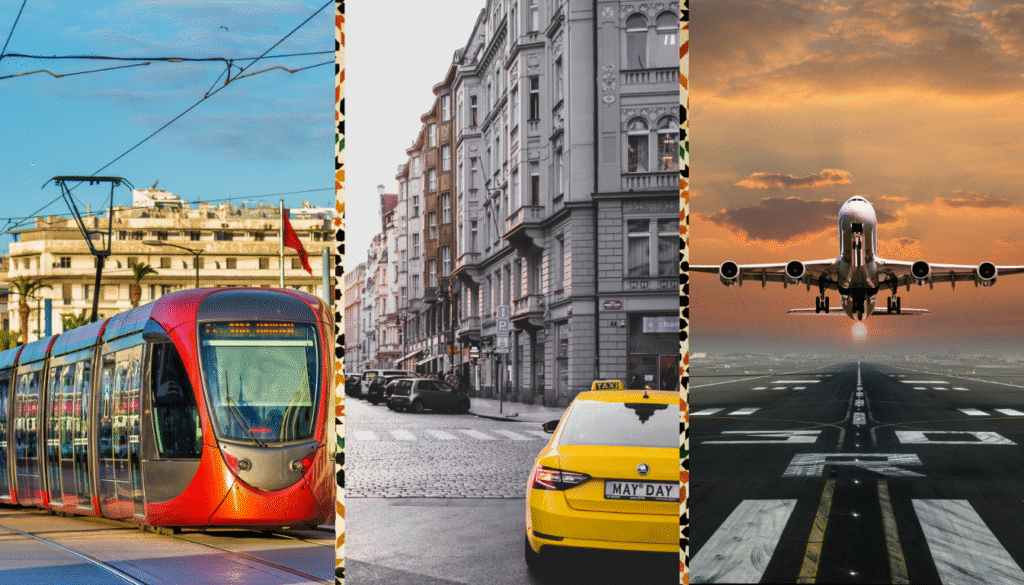
“B’chal?” (How much?) & “Combien ça coûte?” (How much does it cost?)
Negotiating fares is a key part of using transportation in Morocco. You can ask “B’chal?” (How much?) or “Combien ça coûte?” (How much does it cost?) to find out the price.
Practical Phrases for Taxis, Trains, and Public Buses
Here are some practical phrases to help you navigate Morocco’s transportation system:
| English | Arabic Phrase | French Phrase |
|---|---|---|
| Where is…? | Fin…? | Où est…? |
| How much? | B’chal? | Combien ça coûte? |
| Train station | Mahatta | Gare |
Negotiating Fares and Understanding Directions
When using taxis, it’s essential to negotiate the fare before you start your journey. You can use phrases like “Shhal?” (How much?) or “Combien ça coûte?” to agree on a price. Also, knowing directions like “straight” (droit), “left” (gauche), and “right” (droite) will help you navigate.
By mastering these phrases, you’ll be able to navigate Morocco’s transportation system with confidence. This will make your language immersion vacations or multilingual holiday experiences even more enjoyable.
Restaurant Phrases for Memorable Dining Experiences
To enjoy Moroccan cuisine fully, learning key phrases in Arabic and French is key. Morocco is famous for its rich food culture. Knowing how to order and appreciate your meal can make your trip better.
“Mumkin menu?” (Menu, please?) & “La carte, s’il vous plaît” (The menu, please)
When you’re ready to eat, asking for the menu is important. Say “Mumkin menu?” in Arabic or “La carte, s’il vous plaît” in French. These phrases help you start your meal smoothly.
“Mzien bezzaf” (Very good) & “C’est délicieux” (It’s delicious)
Showing you like your meal is part of dining in Morocco. Saying “Mzien bezzaf” in Arabic or “C’est délicieux” in French shows you’re thankful for the food and the experience.
Ordering Moroccan Specialties in Both Languages
Morocco is known for dishes like tagine, couscous, and pastilla. When ordering, ask for recommendations or what you prefer in Arabic and French. For example, you can say “Mumkin tashrah li?” (Can you explain to me?) or “Pouvez-vous me recommander quelque chose?” (Can you recommend something?).
Dietary Restrictions and Special Requests
If you have dietary needs, tell the server clearly. Say “Ana nabaati” (I’m vegetarian) or “Je suis végétarien” (I’m a vegetarian). For other requests, use phrases like “Maafi lahm” (No meat) or “Sans gluten, s’il vous plaît” (Gluten-free, please).
Using these phrases makes your dining experience better. It also shows respect for the local culture, making your interactions more meaningful and fun.
Shopping and Bargaining in the Souks
Shopping in Morocco’s markets is thrilling, thanks to Arabic and French phrases. As you explore the souks, knowing key words boosts your bargaining skills. It also makes shopping more fun.
“Ghali bezzaf” (Too expensive) & “C’est trop cher” (That’s too expensive)
When you find something you love but think it’s pricey, say “Ghali bezzaf” or “C’est trop cher“. For example, “Cette tapisserie est magnifique, mais c’est trop cher” (This tapestry is beautiful, but it’s too expensive).
A local vendor says, “Knowing Arabic or French makes a big difference in bargaining. Vendors are more open to prices when you try to communicate.”
“Shhal akhir taman?” (What’s your best price?) & “Votre dernier prix?” (Your last price?)
To get the best deal, ask for the lowest price. Say “Shhal akhir taman?” or “Votre dernier prix?“. This shows you’re serious and ready to negotiate. For instance, “Je suis intéressé par ce produit, votre dernier prix?” (I’m interested in this product, what’s your last price?).
The Art of Haggling in Moroccan Markets
Haggling is key in Moroccan souks. It’s about finding a good price and building a good relationship with the vendor. Using the right phrases and showing interest helps create a positive negotiation atmosphere.
Numbers and Currency Terms in Arabic and French
Knowing numbers and currency terms is important for bargaining. Here are some key terms:
| Number | Arabic | French |
|---|---|---|
| 1 | Wahid | Un |
| 10 | Ashra | Dix |
| 100 | Mia | Cent |
Knowing the Moroccan Dirham (MAD) and asking “B’ch-hal?” (How much is it?) is also helpful.
“The key to successful haggling is to be respectful and friendly. Showing appreciation for the craftsmanship and expressing your budget can lead to a win-win situation.” – A seasoned traveler
Mastering these phrases and the art of haggling makes shopping in Morocco’s souks more rewarding. It enriches your language immersion vacations.
Emergency and Health-Related Communication
In Morocco, knowing Arabic and French can save your life in emergencies. Whether in Marrakech’s busy streets or the Atlas Mountains, knowing how to ask for help is key. It’s vital for any traveler.
“Mhtaj mosa’ada” (I need help) & “J’ai besoin d’aide” (I need help)
In an emergency, your first step is to ask for help. Saying “Mhtaj mosa’ada” in Arabic or “J’ai besoin d’aide” in French can help. These phrases are a must for travelers.
“Ayn sbitar?” (Where is the hospital?) & “Où est l’hôpital?” (Where is the hospital?)
Finding a hospital quickly is critical in emergencies. Asking “Ayn sbitar?” or “Où est l’hôpital?” can lead you to the nearest medical facility.
Essential Vocabulary for Medical Situations
Knowing key medical terms in Morocco is important. Saying “H-tajit nchouf el tabib” (I need to see a doctor) or “Aâyak L tabib / ambulance!” (Call a doctor/ambulance) is vital. Also, knowing “Fayne Sbitar” (Where is the hospital?) can help you find care fast.
| Situation | Arabic Phrase | French Phrase | English Translation |
|---|---|---|---|
| Needing a Doctor | H-tajit nchouf el tabib | Je dois voir un médecin | I need to see a doctor |
| Calling for Emergency | Aâyak L tabib / ambulance! | Appelez un médecin/ambulance! | Call a doctor/ambulance! |
| Locating a Hospital | Fayne Sbitar? | Où est l’hôpital? | Where is the hospital? |
Emergency Contact Information and Resources
Having emergency contact info ready is smart. This includes the local 911 and insurance details. Being prepared can greatly help in emergencies.
Building Connections with Locals
To really get into Moroccan culture, start by talking to the locals. Say hello and use simple questions to start conversations. This can lead to cross-cultural tourism experiences that are truly meaningful.
“Ana min Amrika” (I’m from America) & “Je viens des États-Unis” (I come from the United States)
Start with a simple hello. Saying “Ana min Amrika” or “Je viens des États-Unis” is a great way to break the ice. It shows you’re eager to talk and can spark interesting chats about your cultures.
“Mezian nta’araf ‘alik” (Nice to meet you) & “Enchanté(e)” (Pleased to meet you)
After saying hello, it’s polite to say you’re glad to meet them. Use “Mezian nta’araf ‘alik” in Arabic or “Enchanté(e)” in French. It shows you value their company.
Conversation Starters for Cultural Exchange

Start conversations by asking questions like “Aiz/aiza e?” (What do you want?). This can lead to talks about food, culture, or everyday life. It makes your multilingual holiday experiences
By using these phrases and being open to new talks, you can make your Moroccan trip unforgettable. It will be filled with cultural exchanges and memories.
Pronunciation Tips for Confident Communication
Learning to say Arabic and French words right can really help you connect with locals in Morocco. As you wander through markets, historic spots, and beautiful views, your attempts to speak the local languages will be valued by the people you meet.
Mastering Arabic Sounds: Throat and Emphatic Consonants
Arabic has sounds that are different from many other languages, like the emphatic consonants and throat sounds. For example, the letter “ḥ” is a hard, throaty “h” sound. Listen to native speakers and practice saying these words. There are many online tools and apps that can help with pronunciation.
French Nasal Vowels and Accent Challenges
French is known for its nasal vowels, which can be tricky for those who don’t speak it. Words like “vin” (wine) and “vain” (vain) differ mainly in their vowel sounds. Focus on these differences to get your pronunciation better. Also, remember to use French accents correctly, as they change word meanings.
Practice Techniques for Daily Improvement
To get better at speaking every day, listen to native speakers and repeat what they say. Use language apps, watch videos in Arabic and French, and talk to locals.
Conclusion: Enriching Your Moroccan Journey Through Language
As you wrap up your Moroccan adventure, you’ll see how language is key. Using the phrases and tips from this article, you can make your trip more special. You’ll connect deeply with locals on cultural exchange trips.
Speaking Arabic and French makes traveling in Morocco easier. Whether you’re getting around, eating at a local spot, or shopping, it helps a lot. As someone who speaks Arabic and French, you’ll get to know Morocco’s culture better. You’ll also make stronger bonds with the people you meet.
By learning the local languages, you’ll have a more real and engaging experience. You’ll get to enjoy Morocco’s sights, sounds, and tastes fully. So, when planning your next Moroccan trip, remember that language is a powerful tool. It can make your travels unforgettable and create lasting memories.

